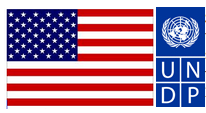The Sustainable Development Goals (SDGs) must be owned and invested in by everyone, to ensure universal achievement and leave no one behind, said UN and US officials during an event on ‘Implementation of the 2030 Agenda in Asia and the Pacific.' UNDP Assistant Administrator Haoliang Xu and US Special Coordinator for the Post-2015 Development Agenda, Tony Pipa, highlighted ways to translate the 2030 Agenda for Sustainable Development into concrete, actionable plans, and shared examples of approaches to implementation.
 3 February 2016: The Sustainable Development Goals (SDGs) must be owned and invested in by everyone, to ensure universal achievement and leave no one behind, said UN and US officials during an event on ‘Implementation of the 2030 Agenda in Asia and the Pacific.’ UNDP Assistant Administrator Haoliang Xu and US Special Coordinator for the Post-2015 Development Agenda, Tony Pipa, highlighted ways to translate the 2030 Agenda for Sustainable Development into concrete, actionable plans, and shared examples of approaches to implementation.
3 February 2016: The Sustainable Development Goals (SDGs) must be owned and invested in by everyone, to ensure universal achievement and leave no one behind, said UN and US officials during an event on ‘Implementation of the 2030 Agenda in Asia and the Pacific.’ UNDP Assistant Administrator Haoliang Xu and US Special Coordinator for the Post-2015 Development Agenda, Tony Pipa, highlighted ways to translate the 2030 Agenda for Sustainable Development into concrete, actionable plans, and shared examples of approaches to implementation.
Georgetown University’s Master of Science in Foreign Service and Asian Studies Program organized the event, which took place in Washington, DC, US, on 3 February 2016.
Pipa said the US is committed to implementing the Sustainable Development Goals (SDGs) at home and abroad, with a particular emphasis on: inclusive growth and ending extreme poverty; accountable, responsive governance and freedom from violence; environmental sustainability; gender equality and empowerment of women and girls; and a new approach to financing and partnership. For the Asia-Pacific region, he noted the importance of inclusive economic growth supported by effective governance and accountable institutions. He also cited challenges related to ending hunger and corruption, ensuring environmental sustainability, tackling climate change, and promoting sustainable urbanization.
Xu shared an example of UNDP’s “whole-of-agenda” approach, in which it partnered with Baidu to create an app for Chinese consumers to connect with waste recyclers. This supported recycling of electronic products, transforming an informal economy into a formal job network and allowing for proper disposal and processing of waste. Addressing the challenges of reaching marginalized groups, Xu recommended targeted interventions, including to reach those whose location hampers public service provision.
A commitment to leaving no one behind must integrate environmental sustainability and climate efforts, Pipa said, stressing that environmental conservation and action on climate change is especially critical in this region. Similarly, Xu underscored the importance of building institutions’ capacity in disaster risk management (DRM).
On financing, the speakers supported the use of a wide range of options including domestic resource mobilization (DRM), private investment, development assistance, and philanthropic engagement. Pipa suggested complementing financing with innovations in data, science and technology, and new and meaningful partnerships. Observing that discussions on SDG implementation seem to “set aside” the Addis Ababa Action Agenda (AAAA), he called for ensuring its integration. Xu said UNDP seeks to act as a partner that offers solutions rather than just as a donor.
Highlighting UNDP’s institutional challenges in supporting SDG implementation, Xu said developing countries expect UNDP to provide technical assistance on economic growth, industrialization and job creation, while donor countries want UNDP to focus on peace, governance and conflict resolution. He added that UNDP faces a dilemma of whether it should transform into an agency funded by its Member States or remain funded by voluntary contributions from Organization for Economic Co-operation and Development (OECD) donors.
The event also addressed the importance of, inter alia: underpinning implementation with dynamic and real-time data to show successes and failures; ensuring open participation and multi-stakeholder engagement; and focusing on country ownership in implementation. [UNDP Statement] [Event Website] [IISD RS Sources]